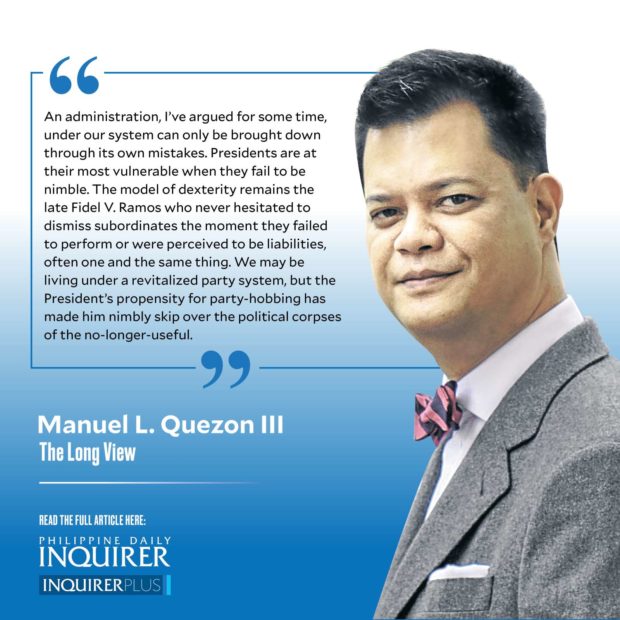What is the state of Philippine democracy, Lee Hsien Loong was asked. “I believe they have a strong party system,” he replied. “Do you mean a one-party system like we have here?” “Oh, no, not at all,” the PM replied, with a hint of a smile. “Oh, a strong multi-party system, then, requiring robust coalition-building and power-sharing?” The PM shook his head, and smiling broadly, replied “No, just a strong party system. Our ambassador in Manila told me the new president, since June 30, has had: a thanksgiving party, a birthday party for his mother, Madame Imelda, a birthday party for a close former senate colleague, a party for his wife the new First Lady, a birthday party for himself, a happy time at the Fiba World Cup Asian Qualifier, and even managed a photo finish at the Eric Clapton Concert in New York. And I just invited him to join the party here for our Grand Prix, and of course he said yes.”
Variations of this joke have been going around, stimulated, not least, by the efforts of the President’s (now-former!) press secretary, and other helpful types. The many blessings of our strong party system aside, just yesterday, we witnessed the latest revision in the cast of characters of the New New Society. The biggest revision to the marquee was first broached around Sept. 16, when word got around that then-Executive Secretary Victor Rodriguez was out, and that his imminent replacement was former chief justice Lucas Bersamin. On the 17th, Rodriguez’s resignation was bared, although it was simultaneously announced that he would serve as the President’s chief of staff (a position last filled by Gloria Macapagal-Arroyo and subsequently abolished). Significantly, as the President departed for America, Rodriguez’s hopes for continued relevance got blasted out of the water when Chief Presidential Legal Counsel Juan Ponce Enrile said the position was untenable, undesirable, and unacceptably power-hungry (remember that he’d been wheeled out to distract Congress by doubling down on defending martial law, while the President avoided the topic by going overseas). Still, the press secretary said the President has signed Administrative Order No. 1, re-establishing the position of presidential chief of staff.
Then Bersamin finally took his oath on Sept. 27 soon after the President arrived back from America. The next day, on Sept. 28, the former CJ-turned-ES, Bersamin, genially attended the budget hearing for the Office of the President. In other news on the same day, loyalist-DDS circles were ablaze with talk of Trixie Cruz-Angeles, erstwhile press secretary, being replaced by former Estrada official Mike Toledo. On Sept. 30, Congress went into recess with the Commission on Appointments having bypassed 14 Marcos nominees for Cabinet and other confirmation-requiring posts. One of them happened to be the press secretary; another, the new chairman of the Commission on Audit.
Yesterday, 10 of the bypassed appointees of the President trooped to Malacañan Palace, the Reception Hall of which has white-painted walls for the first time since the room was rebuilt in 1979, to take their oaths of office. Having been bypassed and with Congress in recess, their appointments expired and required reappointment by the Chief Executive. Except media noticed that the press secretary wasn’t at the event, and neither was Calida and two more (Ivan John Uy of DICT and Nelson Celis of Comelec). By the late afternoon, it was all smoothly official: the press secretary hadn’t been reappointed, having resigned for “health reasons,” just like the COA chairman, Calida, who also quit. And by the way, the executive secretary (who’d been reappointed) told the press, there was no such thing as Administrative Order No. 1 creating a chief of staff position: his predecessor would not, accordingly, be part of the Marcos Cabinet.
What was interesting, or perhaps it’s more accurate to say, what proved to be par for the course and typical was that the three-month tenure of Rodriguez as “Little President” was roiled by sustained attacks on his competence and integrity by allies and supporters of the President, ranging from his online apparatus to other interested parties affiliated with Too-Big-To-Ignore sectors such as the Iglesia ni Cristo. In contention were apparently highly flawed appointments and all sorts of startling amounts. What the then-executive secretary had going for him was initially the full trust, and then, apparently the soft-hearted pity, of the President, but what he had going against him wasn’t just a sustained, take-no-prisoners attack echoed by powerful blocs, but not least, the possibility the First Lady wasn’t pleased, either. When word got around that Rodriguez was considered close to Sen. Imee Marcos, it seemed pretty clear he was sunk, since no one considers her the President’s favorite sister. Using Enrile to blast his remaining attempt to cling on to power may have seemed like overkill, but it was effective.
An administration, I’ve argued for some time, under our system can only be brought down through its own mistakes. Presidents are at their most vulnerable when they fail to be nimble. The model of dexterity remains the late Fidel V. Ramos who never hesitated to dismiss subordinates the moment they failed to perform or were perceived to be liabilities, often one and the same thing. We may be living under a revitalized party system, but the President’s propensity for party-hobbing has made him nimbly skip over the political corpses of the no-longer-useful. The manner in which, taking a cue from Enrile, the Marcoses have quietly but not-so-subtly, indicted Fabian Ver as the cause of their original fall from power, suggests an interesting takeaway as we all attempt to divine the core, if any, of the current Chief Executive: in the New New, there will be little of the loyalty that caused so much trouble.
Email: mlquezon3@gmail.com; Twitter: @mlq3
